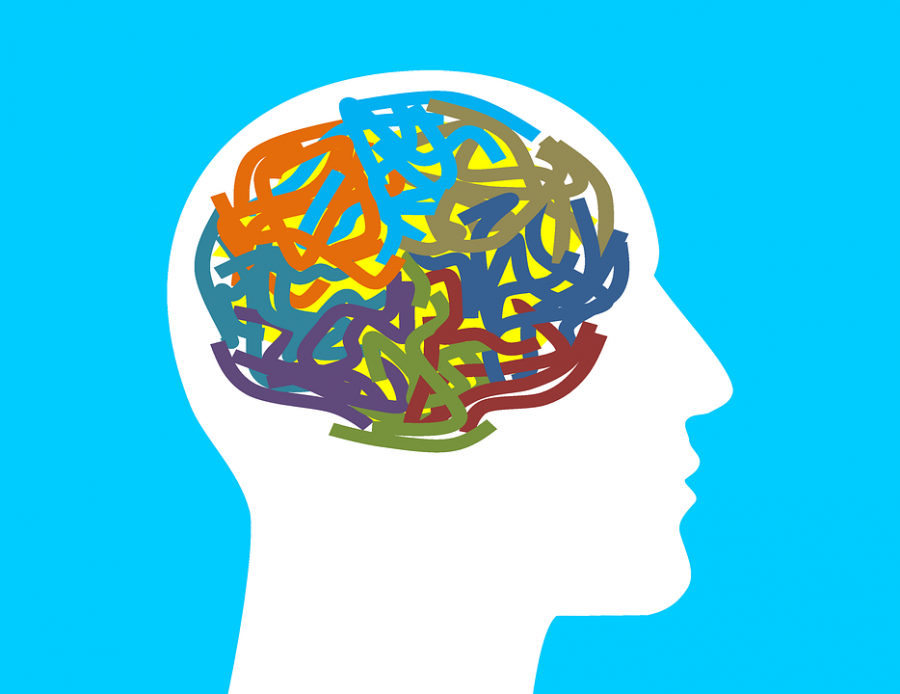Mental health awareness and evolution
June 6, 2019
In 1949, May was declared Mental Health Awareness Month. Since then, more and more individuals and organizations have decided to advocate for mental health; through their actions , the stigma around different disorders, such as depression and anxiety, have began breaking in the United States. At the same time, mental health issues have become more prevalent in society.
Back in ancient Roman and Greek times, it was a commonly accepted idea that mental health problems were a punishment from God. This concept later evolved and caused people to believe those who struggle with mental health are unsanitary and deserve to be treated badly.
Because of this, mental institutions in the 1800s resembled prisons. Patients were caged and received cruel treatments. Some individuals, like Dorothea Dix, saw that this was wrong and sought to fix it. Dix then petitioned for asylums that treated their patients better, and her hard work paid off as the government ended up instituting laws and opening 32 more mental hospitals. Since then, the stigma around mental health has started breaking.
“Amongst younger people, many are becoming more accepting and don’t hold a sort of negative vibe towards those who suffer with mental illness,” sophomore Sheyenne Sanchez said. “[They] instead have become a warm and comforting embrace for the hard times and will often encourage you to get the help you need if you haven’t gotten it yet.”
At the same time, there are still people who may be considered stuck in the past and not understand that mental health disorders are legitimate medical problems.
“Amongst some of the older generations, they still don’t see it as a real issue that takes lives,” Sanchez said. “For example, some of my aunts believe it’s just a way to seek attention from parents and caregivers.”
According to various medical professionals, organizations, and individuals, it is crucial that the stigma around mental health becomes non-existent because it causes the majority of people who struggle with mental disorders not to seek health since they are embarrassed or feel worthless.
“It hurts me to see the way it’s taboo in many places and something that is seen as a weakness,” Sanchez said. “For the people who acknowledge that they need help, the stigma sometimes stops them from seeking help as they become afraid to look weak and that’s taken many lives just because society is afraid to change.”
One way mental health awareness is spreading is through classes, such as the psychology class at Rochester High School.
“We have an entire unit dedicated to disorders and we talk about it in a respectful manner,” Sanchez said. “We get to learn a bit more about what the daily life of the people who have disorders and the more you know, the more understanding you can be.”
Sanchez herself suffers from Major Depression Disorder (MDD). Depression is a mental health disorder that causes those affected to feel sad or angry even when they are doing something fun or that makes them happy. 16 million Americans say they struggle with depression each year, but over half of those who truly have a depression disorder do not speak out due to the stigma round it. Sanchez also struggles with two different types of anxiety disorders. Anxiety causes people to persistently feel scared or worried for no apparent reason, which makes it difficult to enjoy life’s happy moments.
“MDD usually goes away on its own after about half a year but mine has persisted for over three, almost four,” Sanchez said. “I miss almost a month of school in all each school year because of panic attacks that leave me unable to handle my surroundings, or I come late to school because my body physically cannot get out of bed, or I find myself unable to eat or I simply cannot stop shaking. Even then, I have my mom pick me up early when it becomes too much for me to handle. I am even considering homeschool to make it easier for my depression and anxiety.”
Another example of a mental health disorder is bipolar disorder. Someone who suffers from this has a constant and random fluctuation in mood. It affects 3.3 millions Americans, but that is only the amount of people who knowingly have BP. Many individuals struggle with bipolar disorder for years before realizing it or being diagnosed.
Sanchez feels it is significant to advocate for mental health awareness, and she does this by talking about her experiences.
“A lot of people walk around with mental disorders without knowing and it’s a taboo subject to bring up,” Sanchez said. “Having a month awareness being spread helps to decrease the stigma that surrounds such a critical issue that affects many Americans and people around the world… People often tell me I may be faking it when I am open about it, but my own personal experience is the way I like to raise awareness as I try to work my way on the road to recovery.”
Over the past several years, the media has made various attempts to raise awareness for mental health. For example, in 2017, a Netflix original series called “Thirteen Reasons Why” was released. This show revolves around the reasons why a high school student decided to take her life, as well as the other struggles she faced. The effect this show has had on viewers can be controversial.
“Suicide rates went up after its release,” Sanchez said. “The reason why? The awareness it was trying to spread was a cash grab. It made depression be out to be something it was not. The spreading of mental health awareness should be accurate, not something that would make it appealing to audiences.”
Although some argue the show’s creators’ intentions were good, Sanchez believes that as a whole, it had a negative impact on its audience. She thinks there are other better ways to advocate for mental health awareness.
“A big part before you can spread awareness is being able to understand what it is you’re spreading awareness of,” Sanchez said. “People are helping others get the help they need. Learning the correct terminology and respecting others and educating others on words like ‘crazy’, ‘bipolar,’ etc. . Others volunteer with local with local charities and organizations.”
Some ways to practice mental health are sharing experiences with mental health problems, inviting others to discuss how they are feeling, educating children and adolescents on what mental health is and how to seek help and encouraging others who are struggling to see a therapist or counselor.
“If you think you or a loved one has symptoms of any sort of mental disorder, please seek help right away, please,” Sanchez said. “Helplines are available to for emergencies, and a counselor can refer you to a specific place.”




